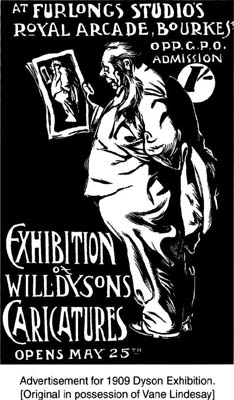Clive James wants to go to the Sydney Writers' festival.
Australian author Katherine Howell - Frantic - gets a guest-blogging stint on Sarah Weinman's Confessions of an Idiosyncratic Mind.
John Joseph Adams interviews Margo Lanagan on "Sci-Fi Wire".
Tim Winton has been hanging around the Sydney Fish Markets.
Ben Hills, the Australian journalist who wrote a controversial biography of Japan's Crown Princess Masako, has received death threats ahead of the September release of the Japanese translation of his book, according to a Kyodo News report".
August 2007 Archives
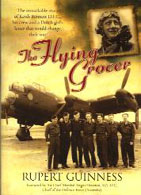 | Rupert Guinness THE FLYING GROCER Random House, 255 pp. Source: review copy Review by Tineke Hazel |
The Flying Grocer is the story of Keith Bennett, a young Australian pilot who flew 30 bombing missions from England over Germany towards the end of the second World War. One of those missions was part of Operation Manna, a food drop over Western Holland during the last five days of the European war.
Simply said but not simply done.
Rupert Guinness, the author, had wanted his father-in-law, Keith Bennett, to write down this remarkable story. Like most men of that generation who had seen the horrors of war, Bennett refused to even talk about that time of his life. After Bennett died, Guinness decided, with the blessing of Bennett's widow, to relate the story himself.
Guinness had access to war diaries, service records and personal letters. He did a lot of research into the training of Bennett as a pilot in Australia and England, and he goes into great detail about all the aircraft specifications, which annoyingly he quotes in metric instead of Imperial which would have been in use then. He gathers a lot of opinions about Bennett from flying mates and family, but somehow his subject remains a shadowy figure. Amongst the letters is one from Jannie van Splunder, a Dutch girl who thanks Keith and his mate Murray for the carton of cigarettes to which he had attached their addresses in Australia and included it in the food drop near Ridderkerk, where Jannie and her friend picked it up. She expresses her gratitude for her family and all the neighbourhood for the food which saved them from starvation. As a six year old I can remember standing on the corner of the Uddelstraat and Soestdyksekade in Den Haag with a group of silently crying neighbours, watching the Lancaster bombers dropping food parcels on the other side of Zuiderpark. My father was involved in the fair distribution of this life-saving food.
Jannie asks Bennett if she can send him anything as a Thank You, but he replies that her gratitude makes him feel the food drop makes some sort of amends for having been part of the bombing raids that destroyed Dresden. Their correspondence dwindles as both get on with their lives on opposite sides of the world.
In 1983 Bennett and his wife visit Jannie and her husband briefly. After Bennett's death Guinness visits Jannie and she shows him where the cigarette parcel was dropped, now a busy 4-lane highway. He had not been aware that the West of Holland had lost so many people in the Hungerwinter of 1944-45 due to the appalling conditions and lack of food.
Guinness has done a fine job of drawing attention to Operation Manna, so we can all remember these fine young men, who did a job to stop Hitler from totally destroying the world as they knew it.
It is interesting that little known facts about the second World War come to light through memories passed on to later generations. It is not a well-known fact that the 2/11th battalion of WA fought on Mt Thermopylae, and was part of a force that held back the Germans for long enough that their operation, Barbarossa, was a failure and ensured Hitler made the same mistake as Napoleon in finding his army bogged down in a fierce Russian winter. The 2/11th was driven back to Crete where they were made into an ANZAC corp and faced the German paratroopers dropping with swishing sound out of silent gliders. They killed many and would have held Crete if it hadn't been for lack of communications with the English command. The Allied command did not learn from this either, as they later made a disastrous drop on Ahrnem near the end of the war.
Australian crime writer, Peter Temple, talks to Bob Cornwell on the "Tangled Web" website. The topics of conversation cover football, cabinet-making, crime writing and Temple's next novel.
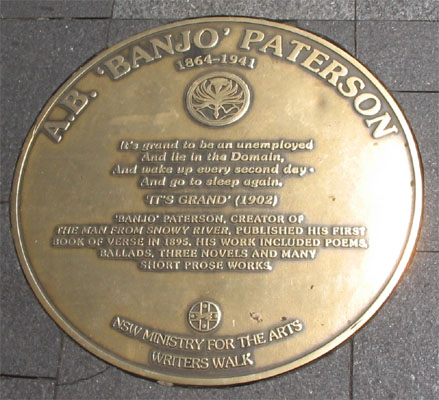 |
A.B. "Banjo" Paterson plaque, Circular Quay, Sydney.
The winners of the 2007 Ned Kelly Awards were announced last night as part of the Melbourne Writers' Festival.
Best Novel
Chain of Evidence by Garry Disher
Best First Novel
Diamond Dove by Adrian Hyland
Best True Crime
Killing for Pleasure: The Definitive Story of the Snowtown Murders by Debi Marshall
Written on the Skin by Liz Porter
Lifetime Achievement Award
Sandra Harvey and Lindsay Simpson
He was the poet of the mountains and tall timber, and time has acclaimed him our greatest. Others have sung of burning plains under a fierce sun, But Henry Clarence Kendall preferred the grandeur of the big hills or the mystery of unfooted dells.
And no wonder! He was born among them at Ulladulla, N.S.W. on April 8, 1841, along with his twin brother, Basil. He was rocked in a cradle made from the trunk of a fallen forest giant, and his first consciousness was of high hills and trees.
And in later life he drifted back to the big timber as all who love it must, and he was with it when his last illness developed, and he went away to die.
Tragedy seems to be the lot of all poets. Kendall knew it early in life when his father, a delicate, sensitive soul, closed his eyes for the last time. Basil Kendall began with a goodly heritage at Ulladulla, N.S.W., but he lost that when his poet son was only four and went to the Clarence River district to eke out a small living. Henry was 10 when his father died.
The widow and family of two sons and three daughters moved to Illawarra and in this beautiful district the young poet found Nature in her most inspiring mood.
Cabin Boy in Whaler
At 14 we find Henry Kendall the cabin boy on a whaler belonging to one of his uncles. In this vessel he lived for two years in Antarctic waters was glad to return. His was not the robust type which seeks physical adventure. Rather was he fitted for explorations of the mind, and these he pursued.
He found work of various kinds in Sydney, and was clerk to James Lionel Michael, a solicitor of Grafton, himself a man of letters. All the time Kendall read and wrote.
His shyness was a torture to him. Once his employer called on him to deliver a lecture in a Grafton hall. When the time arrived young Henry bolted and Michael had to deliver it himself.
Kendall did not last long at the law. He worked his way back to Sydney, where some of his poems had been appearing. Sir Henry Parkes, then editing the Empire, took an interest in him, and later found him work in the Survey Office and the Colonial Secretary's Department.
He wearied again, and set out in 1869 for Melbourne, where he hoped to live by his pen. Here he remained some time. He was the friend of Gordon and Marcus Clarke.
Tragedy pursued him again. His daughter, Araluen, died. Heartbroken, he moved back to Sydney, and a clerkship in a timber company. Then he was sent out to the big timber by the same firm. Possibly the most contented years of his life were spent in the North Coast timber area, for he was back to his beloved forest once more.
Then came another Government position as forests inspector, and it was while filling it that he caught a cold which turned to tuberculosis.
Born April 18, 1841; died August 1, 1882. Only 41! But if his life was short his work is immortal.
Poetry of Effort
Australia has not had much opportunity to breed great poets. Our pioneer stock was mostly drawn from the venturesome and hardy, who were poets in deeds and not in words. For that reason much of our poetry has been of the strenuous kind, or from men who were nurtured in rough surroundings. Gordon, the horseman; Lawson, the swagman; Paterson, the horse lover; Ogilvie, the jackeroo -- these men wrote the poetry of the out-of-doors, which to the poetaster overseas with his centuries of civilization, is hard to understand.
Kendall was the first to apply finer instincts to a rough land in the making, and he found a quiet beauty where others had only seen adventure. For this reason he is very dear to us. Whoever may come after him will never depose him as our first great poet.
Consider the titles of his published collections: Poems and Songs, Leaves from Australian Forests, and Songs from the Mountains. How truly he was wrapped up in the hills and forests!
The poet of the great plains of the interior has still to arise, and we will find him yet just as we found the laureate of the mountains in Kendall.
First published in The Herald, 26 May 1934
Henry Kendall webpage
Henry Kendall photo
The Age
Peter Craven tackles the new J.M. Coetzee novel, Diary of a Bad Year, and finds the author is continuing his recent novelistic interests.
Whatever you make of it Coetzee's recent "Australian" work has been minimalist, self-reflexive and concerned with the micro-dramas of a novelistic sensibility with an intimate resemblance to his own. They are books about the kind of people who write books and they tend to integrate as found objects the workaday writing, if not the experience, of J. M. Coetzee, eminent writer and man of sensibility, now resident in Australia.And so it is with his new book, Diary of a Bad Year...[the novel] is a remarkable book full of passion and wisdom and constantly illuminated by the author's adherence to the truth that shines from the smallest situation or the touch of sensuality that trails from the margin of the most momentous thought.
Needless to say, Craven is pretty impressed with the work: "In his smallest jotting on the page Coetzee is a master we scarcely deserve."
Simon Clews found much to enjoy in Patriot Act by James Phelan, which is the author's second novel featuring ex-navy, investigative journalist Lachlan Fox...Written at breakneck pace using techniques such as filmic intercutting between alternating scenes that build towards a climax, Patriot Act almost owes more to the modern blockbuster action film, than to any literary heritage."
The Zookeeper's War is Stephen Conte's debut novel, and John Bailey finds that the author's unforced style works in the book's favour: "Conte's prose style is unhurried and unforced, rarely indulging in acrobatic feats and only occasionally hinting at the journeyman status sometimes evident in first novels."
The Australian
If the past few weeks is anything to go by, Gerald Stone's latest book, Who Killed Channel 9? is certainly topical. With the departure of the Chief Executive, and the head of the News Department, the tv network is really on the nose. As Allan Hogan puts it: "Gerald Stone is in no doubt about the answer to the question he poses as the title of his latest book. It wasn't Colonel Mustard in the ballroom with the candlestick, it was John Alexander in the boardroom with the bludgeon...The way Stone sees it, Alexander wanted to fix Channel 9 when it wasn't broken. As the head of Kerry Packer's PBL Media, Alexander's bungling interference led to the departure of Nine's most talented executives. And they didn't leave for quiet retirement; they walked into the welcoming arms of Nine's bitter rival, Channel 7. It wasn't long before Nine's long supremacy in the ratings wars was over." He'll either get a cushy retirement package or get picked up by another network where he can weave his magic all over again.
Sidney Nolan produced some of the iconic Australian images in his art, especially his series on the bushranger Ned Kelly. So the new book, Nolan on Nolan: Sidney Nolan in His Own Words edited by Nancy Underhill, will be of interest to a lot of people. Giles Auty came to the book with some expectation, but left rather disappointed: "Most commentators agree that by nature Nolan was original, sensitive and lyrical. Indeed, based on such attributes, Nolan was apt to claim that he would have been equally at home channelling his creative impulses into written rather than visual art forms. Yet on the evidence of the present book this last idea seems something of a vain wish...Nolan's command of language, meaning and linguistic construction was insecure at best and certainly did not suggest successful alternative careers for him in the fields of prose or poetry."
Hazel Rowley pops the big questions in the first two paragraphs of her piece in "The Australian".
Why aren't Australians proud of the writers and artists who have sprung from our soil? The French treat theirs as heroes. The Irish love theirs. Even though James Joyce fled from Ireland as a young man and much of his writing is ferociously difficult, you'd be hard put to find a self-respecting Irish soul who hasn't read something by him, and taxi drivers will tell you: "Today is James Joyce's birthday." Christina Stead surely vies with Patrick White for the status of our greatest writer, but most Australians couldn't tell you whether she is dead or alive, let alone name one of her books.Well, I can tell you she is dead and the name of her best known work is The Man Who Loved Children. I know this because it has been sitting in my To Be Read pile for longer than I care to remember. I'll get to it soon, I promise.
It's been about a year since Bad Faith: A Forgotten History of Family, Fatherland and Vichy France by Carmen Callil was published, and still she gets grief over it. This week Emma Brockes interviews the author about her career, the book, and the reactions to it.
It is 34 years since Callil founded Virago, the feminist publishing house, and over a decade since her relationship with it ended, but her reputation still derives from that era: outspoken, pushy -- strident, in the pejorative of the day -- and inexorably linked with her Australian background...Callil loves a good fight, none more so than with herself; she is bracing about her own nature. "I was always scared, really. I was scared until I grew up. I was scared when I started Virago, I was scared when I started my book. I'm scared when I have to speak in public. I think I've just sort of gotten used to being scared, so I ignore it."
It is a book about disillusionment, personal and cultural. Callil was romantic about Australia when she first came to Britain. "Now I realise what a mistake I made. I made a really big mistake about that, I sort of fantasised about it. Because there can be scumbags anywhere. That's the summary of the situation."
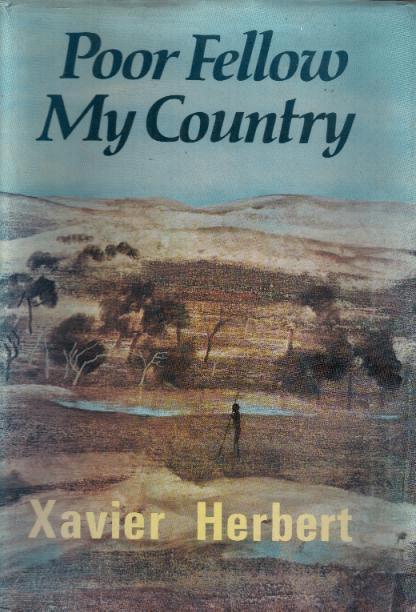
Poor Fellow My Country by Xavier Herbert, 1975
Jacket painting by Roy Crooke
(Book Club Associates 1975 edition)
[This novel was the winner of the Miles Franklin Award in 1975.]
Local Melbourne author, Lucy Sussex, is to conduct a one-day speculative fiction workshop at the Victorian Writers' Centre on Saturday 22 September, 10am-4pm. Charges: Non-member $130, VWC Member $90 / $80VWC conc. Bookings essential - ring 9654 9068.
I bought her a beer on Friday night and she didn't mention this. Looks like I'll have to warm up the grill plate in future.
[Thanks to Horrorscope for the link.]
David Conyers, author of The Spiraling Worm, a 'linked-novel' of seven Cthulhu Mythos horror/espionage stories, co-authored with John Sunseri is interviewed at the "Horrorscope" weblog. The interview is in two
parts.
Long ago, I decided not to focus on "how" my writing career was going to happen, just on "what" I wanted it to be. By knowing what I want and staying focused upon my goals, I find the "hows" just comes to me, exploring options on how to get there, and then trying out the hows see if they work -- or not. Eventually, something does...I'd always wanted to write science fiction ever since I was six when I saw Star Wars for the first time. That desire has never left me. I'd tried writing a novel, and then another, and those few publishers who did give me feedback said something very similar to what my English teachers said: the ideas are there but your grammar is terrible. So I decided to try my hand at writing role-playing games, which seemed easier to write. I started with the Call of Cthulhu game, which had always been a favourite.
A week late but...
Clare Kermond talks to a number of writers and publishers about the tricks of the publishing trade, how to get started and all that. She talks to authors Max Barry, Adrian Hyland, agent Mary Cunnane and Joel Becker, director of the Victorian Writers' Centre.
Karen, on the "Australian, New Zealand Crime Fiction" blog, is posting about her adventures at the 2007 Melbourne Writers' Festival.
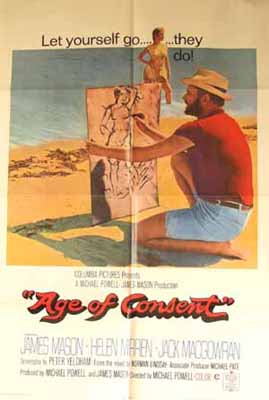
Age of Consent 1969
Directed by Michael Powell
Screenplay by Peter Yeldham, from the novel by Norman Lindsay
Featuring James Mason, Helen Mirren, Jack MacGowran and Frank Thring
The winners of the 2007 "The Age" Book of the Year Awards have been announced.
Fiction
Every Move You Make by David Malouf
Non-Fiction
Colonial Ambition: Foundations of Australian Democracy by Peter Cochrane
Poetry
The Goldfinches of Baghdad by Robert Adamson
The Book of the Year, that is, the best of the best, was announced as Colonial Ambition: Foundations of Australian Democracy by Peter Cochrane.
The glory of a summer night
Was in the sky above,
When by the moon's soft silvern light
I told my sweet my love.
"Dear maid, a love for thee I bear
Far deeper than the sea --
More boundless than the ambient air
In its immensity.
"I prithee put me to the test --
How may thy heart be won --
Send me on some knight-errant quest
To stars, or moon, or sun.
I'll seek the lion in his den,
The tiger in his lair,
And bring their skins as trophies then
To robe thy figure fair.
"I'll plunge me in the ocean deep,
Where sunbeams never shine;
Into the coral caves I'll creep,
Where octopuses twine,
And wrest bright jewels from their care,
The pearls that women prize,
To add their lustre to thy hair
And pale before thine eyes.
"And Mother Earth's bright golden store
I'll reave from her embrace,
And gladly all the Midas store
I at thy feet will place.
By argosies with every breeze
Thy wants shall be supplied.
And gold, and gem, and diadem
Shall deck the Poet's Bride!"
I ceased my song. With unshed tears
Her eyes of azure dimmed,
As though she saw the future years
My loving fancy limned.
I marked her blush -- I almost heard
Her heart's fond pit-a-pats.
Ye gods! How all my pulses strred
To hear her murmur - "Rats!"
First published in Melbourne Punch, 10 December 1907
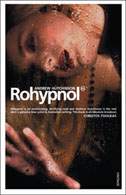 | Andrew Hutchinson ROHYPNOL Vintage, 246 pp. Source: review copy Review by Perry Middlemiss |
Let me say at the outset that this novel is not a light or easy read: the situations portrayed are unpleasant and unsettling, and the characters that inhabit the book are completely unlikeable. When you get to the end it's hard to say that you've actually enjoyed it. But readers who leave this novel repelled by the material will only have seen the surface layer of what this book has to offer. It would be an common enough response to the work, and it is one that I would have some sympathy with. Yet, in doing so, the reader would be missing an important ingredient of Rohypnol, one that lifts it above the general ruck.
Troy, Uncle, Thorley, and the novel's narrator, are a group of disaffected teenagers who have fallen in together for a variety of reasons, and have formed, for want of a better term, a "date-rape" gang. Their favourite mode of operation is for one of their number to spike the drink of a pre-determined target, in a dark pub or nightclub, with Rohypnol, and then to spirit the victim away from the scene and back to an apartment where the sexual assault takes place. The story of the four is told from the point of view of the unnamed narrator, who starts the novel in therapy, fantasising about the therapist and attempting to forestall any form of analysis by her. We are aware early on that something bad has happened; we're not sure what, though it's not hard to figure out. The point of the book is not so much what took place, but how the protagonists got to the state that it could happen.
What we are shown here is the story of teenagers severely out of touch with the society in which they live, and divorced from their own humanity. They appear like predators, circling their prey and waiting for the right time to pounce. Are they really animals, or just disaffected youth who have taken the wrong path? They certainly display a number of sociopathic tendencies: lack of empathy, and control of their own actions being not the least of them. As I said earlier, the characters in the novel are completely unsympathetic, but Hutchinson has hit on a method of making the reader keep turning the pages; searching, I suppose, for some form of redemption or cathartic outcome. In many ways the novel reads like pulp noir fiction: short simple sentences, clipped dialog, short chapters that jump focus and time. There is little or no reflection on the action of the book by the narrator. The only sense of the narrator's purpose comes from several manifesto-like utterances spread throughout the book:
The New Punk is about intelligence...The New Punk is about raiding the twentieth century to make something new...The New Punk is about taking control. Seeing what you want and taking it, no matter the cost...The New Punk is not about remorse...The New Punk is not about moving towards your future. It is about your life right now, impatiently standing still.I don't think these work. They add little to the reader's understanding of the novel's philosophy and break the flow of the story. Better is Thorley's explanation of "the rules", the first of which reads: "Never use your real name." Incorporated directly into the story they have more power. It's hard not to be reminded of Chuck Palahniuk's Fight Club, at this point, which also laid down a set of rules for its participants: "The first rule of Fight Club is never talk about Fight Club."
Various commentators on this book have been critical of it for what they see as an attempt to shock, concentrating on the actions of the characters and the author's alleged "overuse" of swearing in the dialog. Yes, there are a lot of obscenities used in the book, but I've heard worse at the football and in the pub, so I didn't find the swearing here to be overdone nor repulsive. A certain sense of authenticity is required in a work of this sort and I'd rather this approach than one that was obviously toned down to little effect, or that attempted to replicate a form of slangy jargon. I do, in fact, feel that Hutchinson showed a degree of restraint at times and might well have shovelled the swearing on even harder. Does that forgive his use of swearing? No, because there is, in my mind, nothing to forgive. It fits the story and that's all that counts. It does, however, show that he was aware of the effect he was attempting to achieve and didn't just allow the thing to run out of control.
The most shocking thing about this book is the fact that people like these actually exist. If the main purpose of any novel is to propel us into a world outside our own experience then this one succeeds. It will certainly not be to everyone's taste, but I suspect you won't forget it in a hurry.
As Clive James prepares to deliver the opening address of the 2007 Melbourne Writers' Festival tomorrow night, he is interviewed today in "The Age" by Ray Cassin. The main topic of the conversation is James's most recent book, Cultural Amnesia, but it does stray into other areas, including the possibility of a sequel.
Jenny Davidson, US novelist, decided to tag along on the One Shot World Tour organized by Colleen Mondor and interview Australian author Peter Temple. It was only afterwards that she realised that the original Tour was aimed at Australian YA authors. Doesn't matter; we're always happy to hear from Temple about life.
I like horses and horse racing. The animals are beautiful, their nobility shames the often tawdry humans who surround them. I am a gambler too, so racing is a source of pleasure, smugness, pain, and chagrin. What else in life offers so much? Australian Rules football, that's what. It's a game of beauty, elegance and physical danger. Then there is the casual brutality and the bravery and the endurance. And I am speaking only of what it takes to be a fan.He has a few things to say about wrtiing as well, including the prospects of a South African based novel.
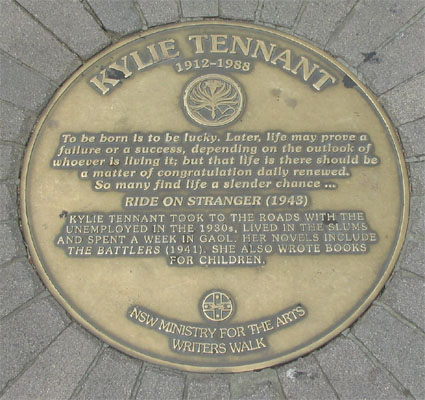 |
Kylie Tennant plaque, Circular Quay, Sydney.
The Age
There haven't been many crime novels set in the corporate world in this country so Leon Gettier is pleased to see The Butcherbird by Geoffrey Cousins: "Cousins can spin a good yarn, and manages to create a great sense of Sydney, although there are passages where his prose goes over the top...A bit more of the Raymond Chandler ethos -- tight economical sentences where lessi smore -- would not have gone astray. Still, it is an entertaining read and the end seems to leave tings hanging nicely unresolved. Much like the dark side of corporate life."
Frances Atkinson finds that Joel and Cat Set the Story Straight, by Nick Earls and Rebecca Sparrow, "works for several reasons; we get to know Joel and Cat individually (both of them are a lot more vulnerable than they let on) and we get to see them interact together via the writing assignment, which provides the laughs...Humour is a big part of the book, but there's drama, too, and both Cat and Joel experience the aftershock of domestic unhappiness. There are more than a few surprises but it would be a shame to reveal them here - particularly one that you can't see coming. The romantic tension between Joel and Cat is finely balanced and the gentle revelation that each quite fancies the other, is sweet but not sickly."
The Australian
Daniel Stacey agrees with recent reviews of Rohypnol by Andrew Hutchinson and seems to get mired in the language without getting to grips with the aim of the book. "When a novel begins with the line 'Troy f---ed up', you can probably guess its ambition will be to shock and that this is unlikely to be carried out successfully. A ready use of expletives, like shape poems and the liberal application of exclamation marks, are devices that quickly lose their effect and purpose." What I can't figure out is why it's considered a sin to shock. Stacey should try reading middle-period Ballard, say Crash. He does hand out some praise: "There are some good, restrained descriptions of dysfunctional Australian teens pointlessly torturing their parents, whose disciplinary alternatives narrow down to jaded expressions of unequivocal love...Generally, though, the grisly elements dominate and are rendered boring by repetition or comical in the manner of Titus Andronicus, neither of which are the author's intentions."
There have been few film memoirs from Australia so it is interesting to see the release of Josh Hartnett Definitely Wants to Do This: True Stories From a Life in Screen Trade by Bruce Beresford. Phillip Adams raises the main point about film directors right up front: "are directors born mad and attracted to a profession where madness is de rigueur? Or are they driven mad by the process and the insanity of others? I don't think Bruce Beresford is insane. Not quite, not yet. When working with him decades ago, however, I realised he was eccentric. But amusingly so." If you weren't mad when you entered the industry you might well be after about 30 years.
The shortlisted works for the 2007 The Age Book of the Year Awards have been announced.
Fiction
The Time We Have Taken by Steven Carroll
Sucked In by Shane Maloney
Every Move You Make by David Malouf
Careless by Deborah Robertson
Carpentaria by Alexis Wright
Non-Fiction
Back from the Brink: How Australia's Landscape Can Be Saved by Peter Andrews
The Great War by Les Carlyon
Colonial Ambition: Foundations of Australian Democracy by Peter Cochrane
Slicing the Silence: Voyaging to Antarctica by Tom Griffiths
Unpolished Gem by Alice Pung
Poetry
The Goldfinches of Baghdad by Robert Adamson
The Passenger by Laurie Duggan
El Dorado by Dorothy Porter
Earthly Delights by S.K. Kelen
Picnic by Fay Zwicky
The winners in each category, as well as The Book of the Year, will be presented at the Melbourne Town Hall on August 24 before Clive James delivers the opening address of the 2007 Melbourne Writers' Festival.
[Update: I inadvertently left Carpentaria out of the fiction category. Put it down to incompetence.]
Back in 2005, Ben Peek undertook to interview as many Australian sf and fantasy writers as he could, and called it 2005 Snapshot. Two years on, Girlie Jones decided that was such a good idea she'd get a few friends together and do it again.
The websites involved in the 2007 Snapshot are:
http://kathrynlinge.livejournal.com
http://girliejones.livejournal.com/
http://benpayne.livejournal.com/
http://kaaronwarren.livejournal.com/
http://cassiphone.livejournal.com/
And the interviews all took place last week. The best place to look into those interviews is, oddly enough, back at Ben Peek's weblog. Ben points out the differences between his survey in 2005 and this latest version, and is in the best position to comment on the changing fortunes of a number of the writers interviewed. If you want to know what's happening on the Australian sf and fantasy fiction scene, then this is the place to start.
In a comment to a post here concerning recent internet reviews of Australian books, Genevieve asked: "it looks like you are finding more reviews of Oz books on weblogs than in the paper at present - would that be a reasonable assumption? or is it just a lean couple of months for publishing down here? Care to take a guess?"
A big topic. Firstly, we need to be aware that a lot more Australian books are gaining a foothold in non-Australian markets these days. Twenty years ago it would have been possible to count the number of Australian sf or fantasy writers on the fingers of one hand. Now they number over 50. Similarly in the crime genre. So the sheer quantity of Australian books finding their way into foreign markets has increased. Secondly, the number of literary weblogs has climbed dramatically since I started Matilda three years ago, therefore the number of possible web-based reviews has also risen. Thirdly, it's now easier to find these reviews with the advent of Google Alerts.
I don't think the number of reviews of Australian books has changed all that much in the mainstream media in the past few years, at least on a year-by-year basis. There is, as best I can see, a distinct seasonal aspect to publishing in this country. Which, I suppose, is merely a reflection of what happens in the US and UK. But we do have some strange scheduling arrangements that have an affect. You might be aware that if a book is published in a non-Australian English-language market it must then be published in Australia within, I think, 30 days or else booksellers are free to import it. This means, for example, that the major UK novels become available here within a month of their original publication. So Ian McEwan's, or Salman Rushdie's, or even Beryl Bainbridge's latest will be in our bookshops very quickly. A few years back they might well have been held over for the Christmas market, and therefore not available until well after the Man Booker longlist/shortlist reading period. I can remember in the mid-1990s struggling to get copies of books on the Booker shortlist as they just weren't available here.
I may be going out on a limb here but it seems to me that books in the UK follow a distinct prize and seasonal publishing schedule according to genre. Big genre novels, or "airport" novels, will be published in time for the summer holiday season. "Literary" fiction is published in time for Christmas (presents and winter), autumn in time to be eligible for the Man Booker prize, and spring because that's all that's left.
That reads as a rather simplistic view of the schedules, and I may well be completely wrong, but it fits my experience. Over the past 10 years or so I've been compiling, during the year, a list of novels that might make the Booker shortlist (see my woeful selection for 2007). Each entry is accompanied by a note indicating the month of first publication. I have been meaning to go back over this data, at some time, to try to figure out some sort of pattern. If I get a free week I might have a chance. I think it might have an interesting tale to tell.
Germaine Greer's next book will be titled Shakespeare's Wife and will be published in September. We can probably assume, though it isn't exactly stated, that the piece published in "The Guardian" over the weekend is an excerpt.
Greer makes one interesting point I hadn't come across before:
By the 1580s, people who couldn't read were sensible of a spiritual as well as a social disadvantage, because they were barred from direct access to the word of God. In the winter, when there was little or no work for children in the fields, even the humblest farming villages set up dame schools, where girls were taught to read and sew, boys to read, write and cast accounts. Reading was essential if a woman was to follow her daily devotions; sewing provided for her and her family. In Shakespeare's plays we encounter men who cannot read, but never women.
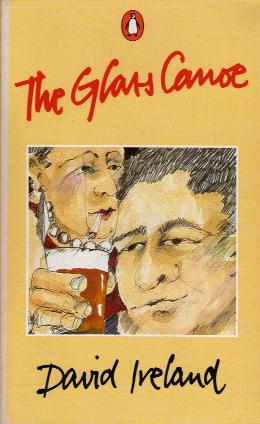
The Glass Canoe by David Ireland, 1976
Cover illustration by Lauren Murray
(Penguin 1986 edition)
[This novel was the winner of the Miles Franklin Award in 1976.]
About 10 days back my home laptop finally gave up the ghost. I'd been thinking about replacing it for a while but its demise hastened my purchase. I now have a new all-singing, all-dancing laptop in the house - unfortunately Mr Gates is still controlling the play-sheet - but am having trouble getting my old email files back into accessible shape.
So, if you've written to me in the past month and wonder why I'm being so rude as to not reply, there's your reason.
Rest assured I'm working on it, but I'm not holding out much hope.
Michael Robotham, author of The Night Ferry, is interviewed by Peter Wilmoth in "The Age".
Robotham says a writing career in the small Australian market is hard and he acknowledges his happy position. "When you dream of being a writer since you were 12 years old and initially your aim is to get a book published and then when you discover you're not only going to get it published but you're going to be able to do it full-time, it's almost as though, 'When did I sell my soul to the devil, and when is he going to ask for it back?'"
Major League baseballer Mark McGwire was said to spend his off-seasons in Adelaide as he had friends there and could walk the streets completely unnoticed. Bruce Springsteen found something similar last time he was in Australia.
The point is, though, McGwire didn't visit sport stores and browse the baseball bats, and Springsteen steered clear of guitar shops. But I guess Stephen King just couldn't help himself when he was sprung surreptitiously signing books - his own presumably - in an Alice Springs bookstore. A few years back King drove a motobike around the backblocks of Queensland unannounced. Seems he's on a similar excursion this time. Just do the Aussie thing - leave the guy alone.
The shortlists for the 2007 Premier's Queensland Literary Awards have been released. The winners will be anounced on Tuesday 11th September.
Unpublished Indigenous Writer - The David Unaipon Award
Elizabeth Eileen Hodgson for Skin Paintings
Jeanine Leane for Dark Secrets and Solid Wisdom
Lorraine McGee-Sippel for Toots
Nicole Louise Watson for Return of the Clever Man
Poetry Collection - Arts Queensland Judith Wright Calanthe Award
Robert Adamson for The Goldfinches of Baghdad (Flood Editions)
Dr Laurie Duggan for The Passenger (University of Queensland Press)
Emeritus Professor Tom Shapcott for City of Empty Rooms (Salt Publishing)
Petra White for The Incoming Tide (John Leonard Press)
Australian Short Story Collection - Arts Queensland Steele Rudd Award
Cate Kennedy for Dark Roots (Scribe)
Margo Lanagan for Red Spikes (Allen & Unwin)
David Malouf for Every Move You Make (Random House UK)
Ryan O'Neill for A Famine in Newcastle (Ginninderra Press)
Film Script - Pacific Film and Television Commission Award
Joel Anderson for Lake Mungo (Mungo Productions Pty Ltd)
Shayne Armstrong, Shane P Krause and John Hewitt for Acolytes (Stewart & Wall Entertainment)
Brendan Cowell and Anthony Hayes for Ten Empty (Yeah Right Pty Ltd)
Peter Duncan for Unfinished Sky (New Holland Productions)
Chris Thompson for The Tumbler (Mondayitis / Ztudio)
Television Script - QUT Creative Industries Award
Michelle Offen for East West 101 Episode 5 "Haunted by the Past" (Knapman Wyld Television)
Fiona Seres for Episode 8 "Dangerous" (Southern Star Entertainment)
Sue Smith for Bastard Boys (Flying Cabbage Productions)
Keith Thompson for Lockie Leonard Human Torpedo Episode 26 "Joy to the World" (RB Films)
Non-Fiction Book Award
Professor Tom Griffiths for Slicing the Silence: Voyaging to Antarctica (New South / UNSW Press)
Robert Hughes for Things I Didn't Know (Random House Australia)
Chris Masters for Jonestown (Allen & Unwin)
Science Writer - Department of State Development Award
Dr Stephen Juan for The Odd Body 3 (HarperCollins Publishers Australia)
Mike Morwood and Penny Van Oosterzee for The Discovery of the Hobbit (Random House Australia)
Peter Martin for Killing Us Softly - Australia's Green Stalkers (CRC for Australian Weed Management)
Dr Richard Smith for Crude (ABC Television)
History Book Award
Christopher Clark for Iron Kingdom (Allen Lane, Penguin Books)
Ken Inglis for Whose ABC? The Australian Broadcasting Commission 1983-2006 (Blake Inc)
Dr Philip Jones for Ochre and Rust: Artefacts and Encounters on Australian Frontiers (Wakefield Press Pty Ltd)
Literary or Media Work Advancing Public Debate - The Harry Williams Award
Professor Frank Brennan for Acting on Conscience: How can we responsibly mix law religion and politics (University of Queensland Press)
Richard Flanagan for "Gunns - Out of Control" (The Monthly)
Jonathan Holmes for "What Price Global Warming - Earth, Wind Fire" (4 Corners ABC Television)
Chris Masters for Jonestown (Allen & Unwin)
Noel Pearson for Whiteguilt, Victimhood and the Quest for a Radical Centre (Griffith University and ABC Books)
Children's Book - The Dymocks Literacy Foundation
Catherine Bateson for Being Bee (University of Queensland Press)
Pat Flynn for The Tuckshop Kid (University of Queensland Press)
Glenda Millard and Dr Gaye Chapman for Kaito's Cloth (Scholastic Australia)
Glenda Millard for Layla Queen of Hearts (ABC Books)
Young Adult Book Award
Judith Clarke for One Whole and Perfect Day (Allen & Unwin)
Melina Marchetta for On the Jellicoe Road (Penguin Group Australia)
David Metzenthen for Black Water (Penguin Group Australia)
Shaun Tan for The Arrival (Hachette Livre Australia)
Drama Script (Stage) Award
Stephen Carleton for "Constance Drinkwater and the Final Days of Somerset" (Queensland Theatre Company)
Stephen Carleton for "The Narcissist" (La Boite Theatre Company)
Campion Decent for "Embers" (HotHouse Theatre and Sydney Theatre Company)
Kit Lazaroo for "Asylum" (La Mama Theatre)
Tommy Murphy for "Holding the Man" (Griffin Theatre Company and Sydney Opera House)
Fiction Book Award
David Malouf for Every Move You Make (Random House UK)
Andrew McGahan for Underground (Allen & Unwin)
Professor Janette Turner Hospital for Orpheus Lost (HarperCollins Publishers Australia)
Alexis Wright for Carpentaria (Giramondo Publishing)
Emerging Queensland Author - Manuscript Award
Ian Commins for Life in the Bus Lane
Krissy Kneen for Paper Dolls, Holding Hands
Lee McGowan for Some Tartan Hyde
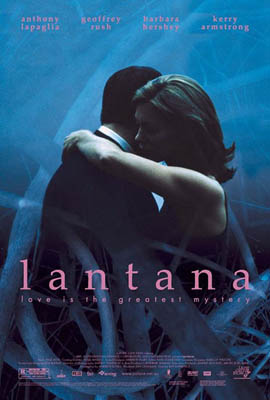
Lantana 2001
Directed by Ray Lawrence
Screenplay by Andrew Bovell from his play
Featuring Anthony LaPaglia, Kerry Armstrong, Geoffrey Rush, and Rachael Blake
Like my friend the Sword, I am fond of a drink,
And am intimate with the bottle,
But the tipple is never red blood, but ink,
Wherewith I moisten my throttle.
That the Sword is a mighty power I know,
Yet methinks I am more than its match.
For that which requires from the Sword a blow
I do with a quiet scratch.
That the Sword has travelled the wide world round
I am quite prepared to own,
But let me ask has it ever found
A spot where the Pen's unknown?
My faith! though the Sword in times past schooled
The various breeds of men,
To-day the affairs of the world are ruled
As much by the peaceful Pen.
Majestic indeed is the ship of steel
As it ploughs the billowy seas,
But the sailor in charge of the steering wheel
Can demolish it should he please.
Of the engine's strength we are often told
With its ponderous driving gear,
But its giant forces are all controlled
By the hand of the engineer.
I do not flash in the sun's bright ray,
'Midst the shouting of armed men.
Yet none the less must the Sword give way
To the mightier power of the Pen.
Yet which of us two has the greatest might
Let men for themselves decide:
'Tis the role of the Sword to drive and smite,
'Tis that of the Pen to guide.
First published in Melbourne Punch, 14 November 1907
I had thought the Children's Book Council of Australia awards weren't being announced until tomorrow but "Read Alert", the weblog about youth literature from the State Library of Victoria has a listing of the winners out already.
Book of the Year: Older Readers
Lanagan, Margo Red Spikes Allen & Unwin
Honour Books: Older Readers
Cornish, D. M. Monster Blood Tattoo: Book One Foundling Omnibus, Scholastic
Dubosarsky, Ursula The Red Shoe Allen & Unwin
Book of the Year: Younger Readers
Bateson, Catherine Being Bee University of Queensland Press
Honour Books: Younger Readers
Flynn, Pat Illus: Jellett, Tom The Tuckshop Kid University of Queensland Press
Laguna, Sofie Bird & Sugar Boy Penguin Books
Book of the Year: Early Childhood
Gleeson, Libby Illus: Blackwoood, Freya Amy & Louis Scholastic Press
Honour Books: Early Childhood
Costain, Meredith Illus: Allen, Pamela Doodledum Dancing Penguin/Viking
Wild, Margaret Illus: Niland, Deborah Chatterbox Penguin/Viking
Picture Book of the Year
Tan, Shaun The Arrival Lothian Books
Honour Books: Picture Book of the Year
Rippin, Sally Text: Metzenthen, David The Rainbirds Lothian Books
Spudvilas, Anne Text: Wild, Margaret Woolvs in the Sitee Penguin/Viking
Eve Pownall Award for Information Books
Norman, Mark The Penguin Book: Birds in Suits Black Dog Books
Honour Books: Eve Pownall Award for Information Books
Davidson, Leon Red Haze: Australians & New Zealanders in Vietnam Black Dog Books
Fenton, Corinne Illus: Gouldthorpe, Peter Queenie: One Elephant's Story Black Dog Books
Shirley Hazzard is interviewed in the "New Zealand Listener" by Denis Welch. "Shirley Hazzard may just be the best-kept secret in English literature today. The Australian novelist writes prose with the poet's gift of knowing exactly what to leave out, and when. In its oblique grace her style has, sadly, an almost old-fashioned ring now, but fellow writers like Michael Cunningham and Joan Didion are enraptured by it."
The "Australian, New Zealand Crime Fiction " weblog is pretty impressed with Frantic by Katherine Howell: "Combine the unusual and well handled perspective of the paramedic, with a fast paced, tightly told thriller, and a brave and well executed finale to the story and FRANTIC was a great book - you know you're onto something good when you start a book on Saturday afternoon, finish it on Sunday night and feel somewhat disappointed that the next book - PANIC - won't be available until 2008."
It's taken kimbofo two months to finish her review of Peter Temple's The Broken Shore, not, it seems, from lack of interest, more from a lack of energy and an attempt to work out what was so enthralling about it: "...as a whole The Broken Shore is a refreshing take on crime fiction, both in setting and style. Temple nails the melancholy nature of small town Australian life -- it's petty grievances, its politics, its sense of community -- sprinkles a healthy dose of humour throughout and offers some brilliant dialogue that is so spot-on you can almost hear those flat, Australian accents reverberating off the page. In fact, this novel is such a realistic portrayal of my homeland I'm not ashamed to admit that it made me feel just a wee bit homesick in places..."
In "The New York Times" Walter Kirn finds that J.M. Coetzee's "Inner Workings is [the author's] master class, and he honors us, too, by letting us sit in on it, despite our spotty preparation and the hasty ways we may use it. Knowing something about W. G. Sebald feels a lot better than knowing nothing --particularly when the little knowledge one does have comes from a source as reliable as Coetzee and inspires one to make time to learn much more."
Graeme Flory seems to be finding Australian sf and fantasy novels everywhere he looks these days, "Let me say right now that this is not a bad thing!" He is particularly taken with Karen Miller's debut novel The Innocent Mage and thinks the author may be the best of the current Aussie bunch: "The story itself is told in a deceptively simple style that makes it easy for you to get into the book and then to just keep reading until you're done. I polished this one off in a weekend and I'm keen to see what happens next. Like I said, The Innocent Mage isn't the most original work of fantasy that you'll ever read but after you're done you will have enjoyed it too much to care. An assured debut which promises good things to come."
Flory is only talking about novels in his review, which is why Margo Lanagan doesn't get a mention. Compensation appears with a conversational review of Lanagan's short story collection, Red Spikes, by Eisha and Jules on their "Seven Impossible Things Before Breakfast" weblog. "Speaking of things that stay with you... oh yes, Lanagan's writing has that going on. I've read all three of her short story collections published in the US, and I have been consistently blown away. She's brilliant at creating original worlds and compelling stories. But the haunting quality of her best stories has to do, I think, with the believability of the characters and the intense emotional connection they forge with the reader."
In "The Courier-Mail" Jason Nahrung looks at the curious phenomenon of the "shared world", or "shared universe", as it is sometimes called. This is a literary technique which allows several authors to share a pre-defined literary world. It's more likely to be found in the fields of science fiction and fantasy than anywhere else, though it has been known by the term "crossover" in television series where a main character from one program will turn up on another. A recent, or upcoming (depending on when and where you are reading this) involves a character from "Cross Jordan" appearing on "Las Vegas".
"Shared worlds" series can be either short stories or novels, it matters not, and some of the major examples of the past include Robert Lynn Asprin's Thieves' World, C. J. Cherryh's Merovingen Nights, and George R. R. Martin's Wild Cards series. Nahrung, however, concentrates on Australian versions such as "The Lost Shimmaron" - which will include novels by "Queenslanders Rowena Cory Daniells, Marianne de Pierres, and Trent Jamieson, New South Wales writers Maxine McArthur, Margo Lanagan and Richard Harland, and Dirk Flinthart and Tansy Rayner Roberts from Tasmania" - and the Quentaris series of books which, since 1993, have featured books by Paul Collins, Michael Pryor, Gary Crew, Isobelle Carmody, Lucy Sussex and Margo Lanagan.
Over the past couple of years Australian Young Adult (YA) fiction has been gaining a reputation as some of the most interesting and diverse examples of the genre anywhere in the world. The pity is that not much of it gets reviewed in the literary pages of our maor newspapers and magazines. So it is pleasing to see Rosemary Neill provide a survey of the field in "The Australian." She mentions all the main practitioners and mentions the interesting fact that, each year in Australia, sales of children's books account for about 20% of the $1 billion in retail sales. (I assume she means YA books as well as children's.)
In addition to Neill's article you will also find, on the webpage, a list of recent top reads recommended by Agnes Nieuwenhuizen. It's a pretty impressive list.
In an odd co-incidence, at the same time as the article by Neill, a group of American-based litbloggers has started a series of interviews with Australian YA writers. You can get a full list of the interviews on the "Chasing Ray" weblog. The list of authors includes Margo Lanagan, Melina Marchetta, Anna Feinberg, and Simmone Howell. Along the way a number of Australian YA books are reviewed. An impressive effort
If there is one thing that all writing manuals tell authors about characters it's that they have to be careful in choosing names. Mostly, I think, they do this to forewarn against the possibility of litigation: using the name of a well-known person - actor, politician, businessman - for the vile, disgusting villian of your piece is not considered to be an exercise in good judgement. If you even slightly get close to the real person's character they tend to take offence, and their lawyers become very happy again.
But it strikes me as being nearly impossible for any author to pick a name that is completely unique. Who would have thought, for example, that there would be another Perry Middlemiss in the world? There are at least two others, and one of them has a father with the same first name as my father's. Co-incidences occur, and you've just got to make the best of them.
Unfortunately, in this modern age of the internet, everyone is on the lookout for references to their name cropping up on the WWW. (Back in my fannish days this was called "ego-scanning".) So, whatever name you choose, you can pretty much guarantee that someone out there with an internet connection is going to become aware of it. What you probably wouldn't expect is that one such will write about the co-incidence in a major newspaper. Such is the case with Gina Davies who happens to share her name with the protagonist of Richard Flanagan's latest novel, The Unknown Terrorist. She states her problem right up front: "I know we've only just met, but I feel it's important to get through to you before I see that knowing glint in your eye as I introduce myself - I AM NOT A POLE DANCER." The article is rather mild - there's isn't a big rant from Ms Davies - but it does highlight a problem that authors need to be aware of. As if getting the bloody thing finished wasn't enough of a problem in the first place.
Karen Miller, whose first novel, The Innocent Mage, was released recently, is interviewed by Sandy Auden on the "UK SF Book News" website.
"The Lion, the Witch and the Wardrobe started the journey," said Miller. "It was the very first fantasy novel I ever read, back in fourth class primary school. My imagination was captured, not only by the heroism and emotion of that story, but by the boundless possibilities contained within the speculative fiction genre. There was no looking back after that. My love affair with all things fantasy and science fiction began the day I opened that book and continues to this day.
The Age
Andrew Hutchinson's confronting debut novel is reviewed by Thuy On who isn't overly impressed with it: "Notwithstanding its range of influences and literary predecessors, there's a facile and posturing tough-guy quality to this novel. Offering shock value is easy but Hutchinson isn't interested in providing any reasons behind the transgressions of these teenage marauders." Not that I thought that was the point of the book. He concludes that the author "tries too hard". Again, not a sentiment that I agree with.
Delinquent Angel by Diana Georgeff tells the life-story of poet Shelton Lea, who died at the age of 58 in 2005. Gig Ryan, the newspaper's poetry editor, finds the biography to be a bit patchy, as she tells us that "This book is obviously written by one outside the poetry scene", and "It is remiss that there is no bibliography". She concludes that "Georgeff's emphasis is on the life, not on literary analysis and criticism, of Lea. She is most thorough on Lea's early life and quotes his memories of those times verbatim, but rushes over his later, slightly less rabble-rousing life, when he was happiest."
Michael Gawenda left the editorship of "The Age" to become the paper's US correspondent a few years back. His reports back from that country have now been collected into American Notebook: A Personal and Political Journey and Dennis Altman encounters a number of problems in his reading of it. "Gawenda is a superb journalist and a good writer. As a political analyst his own romance with the US denies him the distance he claims is a requirement for first-class journalism."
The Australian
Peter Corris is mightily impressed with Jacob G. Rosenberg's second volume of autobiography, Sunrise West: "As a reader, I have a strong dislike of the appearance of ghosts, imaginary beings and disembodied spirits in books. But Rosenberg's evocation of his mother, gassed at Auschwitz, and his sister, who threw herself on the electric fence, as if they were real and present, touched me deeply. It takes unusually powerful writing to overcome a deep-seated prejudice...East of Time, published last year, won two literary awards. It would not surprise me if Sunrise West, published this month, did the same."
Stephen Matchett applauds the new biography of Australia's Prime Minister, John Winston Howard: The Biography by Wayne Errington and Peter van Onselen, which received so much attention in the papers a few weeks back. "The routine round of political conflict makes it impossible to assess which issues will define the subject's achievements and failures. The mass of material can overwhelm authors struggling to write for the record through the prism of the issues of the hour. Given these challenges, Wayne Errington and Peter van Onselen deserve a medal for biographical bravery. This is not, cannot be, the definitive biography of John Howard. But it joins Tony Parkinson's (2000) study of Jeff Kennett as one of the best contemporary studies of an Australian conservative politician. In the way they paint the private man and the politician, the authors add a dimension to our understanding of a prime minister whose obvious and endless obsession with winning and holding office is all we have known of him. Their description of his private life presents Howard, at least in part, as the ordinary bloke he has worked so hard to appear to be." They call it a "solid study of a public life in progress".
The shortlists for the 2007 World Fantasy Awards have been released. The winners will be announced at the 2007 World Fantasy Convention over the weekend of November 1-4, in Saratoga Springs, New York.
Nominated this year are Margo Lanagan in the category of Best Collection, for Red Spikes, and Shaun Tan in the cateory of Best Artist.
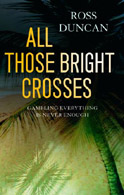 | Ross Duncan ALL THOSE BRIGHT CROSSES Vintage, 335 pp. Source: review copy Review by Perry Middlemiss |
The best thrillers take us on a roller-coaster ride, forcing us to keep turning the pages as the frenetic pace doesn't let up. Literary fiction tends towards the other end of the scale: a slow, introspective journey across a sedate landscape, where everything can be weighed and balanced, inspected and examined. To find a novel that seems to neatly fit between the two, to take some of the best from each genre, is a real treat. All Those Bright Crosses is one of those rare beasts.
Martin Flint is in a bad way. He begins the novel sitting in a dingy bar in Fiji, drinking too much and longing for better days. A long-dormant gambling compulsion has reared up and swallowed him after the death of his young daughter in a drowning accident in his backyard swimming pool. His wife has left him, he's in debt up to his eyeballs, and he's lost his job as sub-editor on a major newspaper.
On the day Cali died Angelica had gone to work. I was at home. When I went out into the backyard to check on Cali, she was not there. Not in the yard or the street or at any of neighbours' places.The only thing that seems to spark any sense of interest in him is a long-forgotten story of lost shipwreck treasure on an island somewhere near Fiji. So he throws in his past life, travels to Fiji on the back of a small inheritance to carry on some extra research into the mystery and finds that the tropical life suits his current mood. Suits it to the extent that he settles into a quiet existence, working part-time for the hotel where he lives and filling in at a local paper. The trouble is he starts to think he might just be trading in a gambling addiction for something else.I thought about this as I stood out on the balcony of the aprtment the night that Angelica left, chainsmoking and watching an argument in the street between a couple of junkies. I told myself then that it wasn't my gambling that had made Angelica pack her bags. In the brutal glare and sudden hush of that moment, when Cali's body was raised from the floor of our swimming pool, something between Angelica and me severed, something we thought we might be able to live without. Because it was impossible to restore.
There was no breeze now, the sky was cloudless and the sun seared into me. A mix of angst and longing, something like homesickness gripped me, and I had an urge to tell Rusty to turn back. But I resisted. I wondered, as I clambered out of the boat, if I had become like one of those men who never quite finishes restoring the vintage car, who pleads in his defence the need for thoroughness, authenticity, perfection, when the truth is he has no idea what he would do with himself if he ever managed to complete the project. It is really just a way of killing time, filling up the emptiness. Looking for treasure. It was the reason I had come to Fiji but it wasn't the real reason I lingered here. That was something I still barely understood. Or perhaps was simply too painful to acknowledge.Taken simply like that, the novel sounds about as boring as it could possibly get. And yet Duncan never allows Flint to get too maudlin, or too introspective. He keeps the mystery of the shipwreck ticking along - mainly in the background, but also occasionally right up front - to maintain a sense of mystery that keeps the reader turning the pages. And all the while a steady change comes over Flint: he starts to become less self-obsessed, more interested in the people who cross his path and more able to reconcile himself to the nagging suspicion that it was really him who was responsible for his daughter's death.
For a long while during the reading of this novel I had the suspicion that Duncan was going to morph the plot into a full-blown treasure hunt. There is some of that -- a mystery con-man from the past, stolen research papers and serious threats of violence -- but the main thrust of the book is Flint's journey towards an inner sense of peace as he comes to terms with himself and what has happened in his life.
On the evidence of this debut novel, Ross Duncan could follow either the thriller or literary paths in his fiction. I expect he would succeed with either.
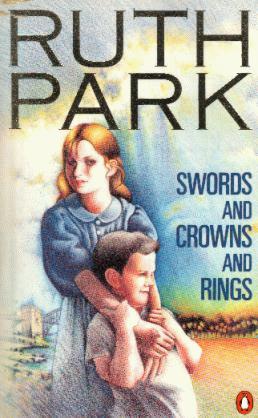
Swords and Crowns and Rings by Ruth Park, 1977
Cover illustration by Fay Planka. Cover design by Cathy Van Ee.
(Penguin 1988 edition)
[This novel was the winner of the Miles Franklin Award in 1977.]
Germaine Greer looks back at 1978, the year a guest at her house in Tuscany left behind a copy of The Thorn Birds by Colleen McCullough. It was to become the "best bad book" she ever read.
If all you now about Australian crime fiction is Fergus Hume and the authors that I've been going on about on this weblog, then I suggest you read Lucy Sussex's brief history of the genre in this country. Lucy looks at some of the forgotten writers from the 19th century and finds that some of their life stories were almost as strange as their works of fiction.
Marianne de Pierres, Australian author of the Parrish Plessis and The Sentients of Orion series, is interviewed at "Cover to Cover" on "The Dragon Page". As best I can figure out, the interview is only available as a downloadable podcast.
The shortlists for the 2007 Victorian Premier's Literary Awards have been released. The winners will be announced on Monday 3rd September.
The Vance Palmer Prize for Fiction
The Time We Have Taken by Steven Carroll
Feather Man by Rhyll McMaster
Carpentaria by Alexis Wright
The Nettie Palmer Prize for Non-Fiction
Voyages to the South Seas: In Search of Terres Australes by Danielle Clode
Whose ABC? The Australian Broadcasting Corporation 1983-2006 by Ken Inglis
Life Class: The Education of a Biographer by Brenda Niall
Unpolished Gem by Alice Pung
Writing Never Arrives Naked: Early Aboriginal Cultures of Writing in Australia by Penny van Toorn
The CJ Dennis Prize for Poetry
The Goldfinches of Baghdad by Robert Adamson
Jack by Judy Johnson
Montale by John Watson
The Louis Esson Prize for Drama
A Single Act by Jane Brodie
Asylum by Kit Lazaroo
It Just Stopped by Stephen Sewell
The Prize for Young Adult Fiction
Gravity by Scot Gardner
Notes from the Teenage Underground by Simmone Howell
Black Water by David Metzenthen
The Prize for Science Writing
The Silent Deep by Tony Koslow
Swimming in Stone: The Amazing Gogo Fossiles of the Kimberley by John Long
Climate Change: Turning Up the Heat by A. Barrie Pittock
The Alfred Deakin Prize for an Essay Advancing Public Debate
The Exiled Child by Meera Atkinson
Voting for Jesus by Amanada Lohrey
The Writer in a Time of Terror by Frank Moorhouse
White Guilt, Victimhood and the Quest for a Radical Centre by Noel Pearson
The Village Roadshow Prize for Screen Writing
The Home Song Stories by Tony Ayres
The Tumbler by Chris Thompson
Ten Empty by Brendan Cowell and Anthony Hayes
The Prize for an Unpublished Manuscript by an Emerging Victorian Writer
The Ghost Writer by Nick Gadd
Dissection by Jacinta Halloran
The Wog Manual by Amra Pajalic
The Grollo Ruzzene Foundation Prize for Writing About Italians in Australia
Chewing Gum in Holy Water by Cheryl Hardacre and Mario Valentini
The Grand Experiment: Two Boys, Two Cultures by Anouk Ride
Madonna of the Eucalypts by Karen Sparnon
The John Curtin Prize for Journalism
Hicks on Trial by Jenny Brockie and Amanda Collinge
Cruising: On Board P&O and Inside the Brimble Inquest by Malcolm Knox
Muslim Leader Blames Women for Sex Attacks (plus associated stories) by Richard Kerbaj
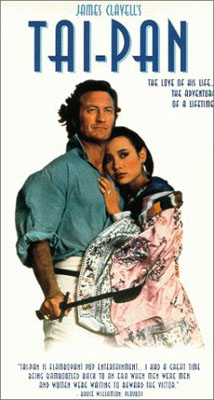
Tai-Pan 1986
Directed by Daryl Duke
Screenplay by John Briley, from the novel by James Clavell
Featuring Bryan Brown, Joan Chen, and John Stanton
Heaven help you, little son of mine; you've not
A prospect in this world. I'll not deceive you.
Your fond but stony father hasn't got
A solitary copper coin to leave you.
You'll have to earn your meat before you chew it,
But darned if I know how you're going to do it.
I have no money -- not a maravedi,
No high-toned friends or powerful influence;
Indeed, I'm so abominably needy
That all I've got would scarce fetch eighteenpence.
And if I wanted half a crown to-morrow, it
Is a cold fact I'd have a job to borrow it.
You're full of brains as any egg of meat,
But what's the good of that? You'd better lose 'em.
They'll never get you anything to eat,
Since you will never have the chance to use 'em.
For, sonny, as already I have stated,
I can't afford to have 'em "eddicated."
You might become a baker man, you know,
And make bread out of sawdust -- no bad plan,
Or you might be a fish purveyor, though
I'd loathe to see my son a "sell-fish" man,
Or as a tailor you'd find opportunity
To "take the measure" of the whole community.
A carpenter, or else an auctioneer,
At one of those trades you might be a gainer:
Either affords a promising career --
One's a plain dealer, t'other a deal planer:
But, then, again, it must not be forgot
Carpenters always are "an ailing" lot.
Then as a poulterer you might succeed;
Though, hark ye, son, and mark your father's words,
It takes a very clever man indeed
To make a pile at dealing in "dead birds."
Brewing's good biz when summer's in the offing,
Yet often puts "an ale into one's coughing."
As undertaker you might roll in gold,
That yellow dross that all men sweat and sin for,
Since undertakers, as a rule, I'm told,
"Carry out" everything that they "go in" for,
Which is a principle that needs must win,
For those who act upon it, heaps of tin.
Then there's the publican; his is a game
Not altogether destitute of merit.
For let who will his occupation blame,
He's none the
less a man of "public spirit."
And though to be "in spirits" is a curse,
Yet to be out of them is surely worse.
Lastly, my son, you might become a bard,
And scribble doggerel for the weekly papers;
I trust that you, however, will discard
All such unholy and pernicious capers.
If you have never scribbled, don't begin it.
I can assure you there is nothing in it.
I cannot tell to what you are destined.
There is no lack God wot of occupations:
But, then, in almost every case you'll find
There's but one berth to fifty applications.
Well, well! since you can never be a royal King,
I'd recommend you to become an oil king.
A king of diamonds, rum, wool, iron, oil,
It matters not a breeches button which.
That man alone, my son, is truly royal
Who is in this world's goods surpassing rich,
Since there is little money cannot buy him;
And naught that man or woman will deny him.
Wherefore get money: honestly for choice,
But get it somehow. Do not be afraid --
Your fellow-man will never raise his voice
To ask rude questions as to how 'twas made,
For like sweet Charity, all hearts it wins,
And covers up a multitude of sins.
First published in Melbourne Punch, 10 December 1907
The mainstream media has been reporting, over the past week, a strange letter from Charlie Rimmer, Group Commercial Manager for Angus and Robertson bookshops, to a number of Australian independent publishers. In essence, this letter states that A&R will no longer take books from small suppliers for sale in their bookshops, without the payment of a fee to offset the suppliers' "unacceptable profitability". Books such as this year's Miles Franklin Award winner, Carpentaria by Alexis Wright published by Giramondo Press, will no longer be available in A&R bookshops. It all seemed a little strange to me at first. But I'm coming to the conclusion that we are probably witnessing the beginning of the end for A&R bookshops here in Australia. If you go into any of their outlets you will be, to put it bluntly, pretty bored by the product on display. Sure all the big sellers are there from all the big publishers, but each store looks the same. They've all become a version of a mass-produced product; hardly recognisable as a bookshop at all.
Now "The Sydney Morning Herald" as printed the original letter, and a reply from one of the small suppliers affected by A&R's decision. It does not make for pretty reading.
Janette Turner Hospital has been promoting her new novel, Orpheus Lost, in both Australia and New Zealand.
Bron Sibree interviewed her for the "NZ Herald":
All her novels have coalesced around a central question. But in the case of Orpheus Lost, she says, "there were multiple questions. What would be the life trajectory at this point in history for someone with a Muslim parent who'd turned to terrorism? How would you negotiate that? And there's also the huge Amnesty question, how do you balance human rights with legitimate means of maintaining national security? To me there's a line you just don't cross. Although we feel as an individual we can do precious little on a world scale, I feel every human being is accountable for decisions made in our name by a government. To me that is a passionately personal question, not just a big social one."
And Lily Bragg profiled the author for "The Sydney Morning Herald":
Torture, kidnapping, despair and lies followed by truth and redemption are all played out. Vividly imagined, Turner Hospital writes with depth and scalpel-like precision."I was fascinated by the moral and emotional repercussions of what happens when innocent people get caught up in extremism, when national hysteria sets in and people are willing to trade civil liberties," she says.
"I was interested in pursuing the inner emotional lives of these people and the choices they make."
A fervent supporter and long-time member of Amnesty International, Turner Hospital says she is constantly aware of the abuse of human rights and unacceptable torture practices around the world. It's this awareness that prompts her to pursue such disturbing themes in Orpheus Lost.
And speaking of Clive James, you can watch, and read a transcript of, an interview with the author conducted by Bill Moyers for the PBS TV network.
Andrew Fenton interviews Clive James for "The Adelaide Advertiser", mainly about his new book, Cultural Amnesia.
Unlike many critics, James is a great generalist. A quote from Jean Prevost in Cultural Amnesia sums him up: "My soul is a fire that suffers if it doesn't burn. I need three or four cubic feet of new ideas every day, as a steamboat needs coal."That, says James, is a very attractive thing to say.
"If you're asking me whether I identify with him, I do, and with almost every other hero in the book," he says. "What I liked about him was that he was interested in everything and wrote about everything."
James will be in Adelaide on October 12 as part of his lecture series titled "Clive James Out On His Own".
Federal Education minister, Julie Bishop, has announced that the Australian Gvernment will allocate funds to $A1.5m to create a Chair of Australian Literature in an Australian university. No decision has been made as to the location of the position, and all universities in the country are being asked to submit bids for the funding. This announcement follows on from recent concerns that not enough Australian literature was being taught in our universities.
Back in 2005, Jonathan Strahan and Garth Nix put together a list of upcoming Australian science fiction and fantasy works. That list was developed in time for the World Fantasy Convention of 2005, which is traditonally held over the Halloween weekend. The list contained books that were scheduled for publication during the upcoming year, and the two of them considered it such a good idea that they've decided to do it again. Jonathan has issued a call-to-arms for publishers and people in the know to provide details of any such works. He has all the relevant contact details.
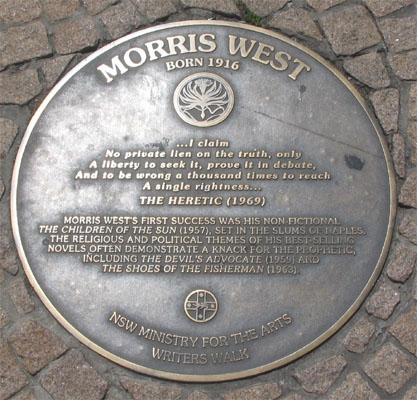 |
Morris West plaque, Circular Quay, Sydney.
The Longlist for the 2007 Man Booker Prize has been announced.
Darkmans by Nicola Barker (Fourth Estate)
Self Help by Edward Docx (Picador)
The Gift Of Rain by Tan Twan Eng (Myrmidon)
The Gathering by Anne Enright (Jonathan Cape)
The Reluctant Fundamentalist by Mohsin Hamid (Hamish Hamilton)
The Welsh Girl by Peter Ho Davies (Sceptre)
Mister Pip by Lloyd Jones (John Murray)
Gifted by Nikita Lalwani (Viking)
On Chesil Beach by Ian McEwan, (Jonathan Cape)
What Was Lost by Catherine O'Flynn (Tindal Street)
Consolation by Michael Redhill (William Heinemann)
Animal's People by Indra Sinha (Simon & Schuster)
Winnie & Wolf by AN Wilson (Hutchinson)
I haven't been paying a lot of attention to this over the past twelve months, so most of the books here are completely new to me. From coverage that I have seen, you'd have to expect that Jones and McEwan will be vying hard for the final prize.
But I am starting to wonder about the need for the longlist. The concept was first introduced to the Man Booker Prize in 2001. Since then the number of books on the longlist has looked like this:
2001 - 18
2002 - 14
2003 - 17
2004 - 22
2005 - 17
2006 - 19
And this year we are down to 13. Surely there were more books than that that deserved to be in the final reckoning; none from the Miles Franklin Award shortlist you'll notice. I'll grant you that 22 in 2004 was a tad high, but 13? It'll be interesting to look through this list a little more thoroughly. There's a few lines of thought I'd like to follow up.
A few weeks late, but M.J. Hyland has been awarded the 2007 Hawthornden Prize, worth £10,000, for her novel Carry Me Down. The novel was also shortlisted for the 2006 Man Booker prize and the 2007 Commonwealth Writers' Prize.
The Age
Only a couple of short Australian reviews in "The Age" this week. Lorien Kaye reviews The Anthology of Colonial Australian Gothic Fiction: "Compiled by Melbourne University academics Ken Gelder and Rachael Weaver, the anthology works well on several levels: as a solid collection of historical artefacts; as testimony to the way the Australian landscape was narrated in a particular period; and as good entertainment."
As Alan Stephens puts it, "At a time when Australia is entangled in yet another uncertain war of invasion, The Minefield provides a deeply disturbing reflection on our capacity to understand such events, let alone manage them." The book he is talking about is The Minefield: An Australian Tragedy in Vietnam by Greg Lockhart. And he concludes: "The contextual breadth of Lockhart's scholarship makes many of the official histories produced by the Australian War Memorial at great expense to taxpayers seem one-dimensional. Fluent in Vietnamese and French, Lockhart brings a depth of understanding to his work we can only wish other authors, not to mention Menzies, Wilton and Graham, had shared...If you read only one military history this year, make it The Minefield; if you don't read military history, make an exception. This is a story Australians need to know."
The Australian
Richard King looks at The Anthology of Colonial Australian Gothic Fiction edited by Ken Gelder and Rachael Weaver, but finds it hard to think of a Gothic literature being possible in Australia: "Hence the question raised by this anthology. Can we talk of Australian gothic? Was the gothic Australianised in the way it was clearly Americanised by great writers such as Edgar Allan Poe and Nathaniel Hawthorne?..According to the editors of this volume it certainly was, but such evidence as they've marshalled is of uneven value." I think "Gothic" is more a state of mind and can exist anywhere.
Nigel Krauth is impressed with By the Book: A Literary History of Queensland edited by Patrick Buckridge and Belinda McKay, finding that "it shows there is indeed a Queensland literature, recognisable from its themes (and not just its geography) for more than 150 years...Reading this book from cover to cover is like being a tourist on a comprehensive tour of Queensland. There is the torture of the coach trip taking in nearly every bump in the road over which Queensland literature has passed, and also the frustration of not being able to get out and look closely at certain wonderful prospects, glimpsed fleetingly."
ABC reporters have released a batch of books lately, and Sian Powell attempts to come to grips with them: Gogo Mama by Sally Sara, Once Upon a Time in Beirut by Catherine Taylor and The View from the Valley of Hell by Mark Willacy: "An American newspaper editor once said journalism provided the first rough draft of history. These three journalists were there on the blood-soaked ground, providing Australians with a view into history unfolding and, all too often, repeating itself."
Andrew Hutchinson, author of the very interesting debut novel Rohypnol, is interviewed in "The Sydney Morning Herald" by Erik Jensen.
"The philosophy, I think people can relate to it," Hutchinson says. "I think you can relate to the aggression. You can read from the start to the end and sort of see where it's coming from; you can feel the frustration."I think you can link in with that [philosophy], but you can't link in with what they're doing. You shouldn't be able to link in with what they're doing.
"Hopefully people can read it and not necessarily understand, and yet empathise in a way and sort of feel with it, feel the aggression and feel the anger. As much as it is this real angst sort of stuff, you're meant to feel it."
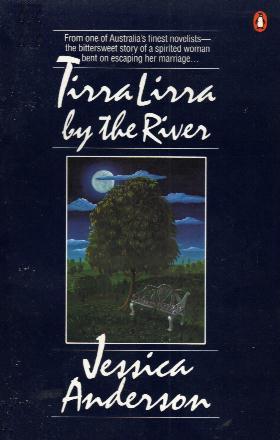
Tirra Lirra by the River by Jessica Anderson, 1978
Cover illustration by Neil Stuart and Mark Strathy
(Penguin 1987 edition)
[This novel was the winner of the Miles Franklin Award in 1978.]
The Complete Stories, a 508-page volume containing the entire body of short fiction by David Malouf has been published in the US, and is reviewed in "The LA Times" by Art Winslow: "it is clear ... that a writer of enormous seriousness and compassion has been laboring in the harsh sunlight of that nation-continent for a generation. Malouf may not be as well known in America as his countrymen Peter Carey and Thomas Keneally, but the release of his Complete Stories brilliantly illustrates his range and the adhesive quality of his prose and characters, which stick in the mind as if, as one of his characters puts it, nothing is to be forgotten: 'Not a soul. Not a pin.'"
Sam Sacks also looks at Malouf's collection in "Open Letters: A Monthly Arts and Literature Review": "The colonization of a wild continent offers an irresistible metaphor for the writing of fiction: in both, through the dedicated work of husbanding, shepherding, the building of some manner of infrastructure, and the establishment of comprehensible codes and rules, the task is to impose a viable -- and moreover, meaningful -- order on otherwise chaotic and indifferent elements...But at least we can say that the dueling social impulses of growth and destruction will cause a profound imprint on anyone caught up in them, and any writer who comes to maturity in the midst of an active colonization will have special insight into a powerful and expansive artistic motif. This has certainly been the case for David Malouf, of Brisbane, Australia."
Damien, on the "Crime Down Under" weblog, is impressed with All Those Bright Crosses by Ross Duncan, as am I: "When searching for a few words that might effectively describe All Those Bright Crosses I considered mystery, and there is a hint of a mystery within, but more definitively this is a psychological struggle reminiscent of that which is seen in a noir novel. It is a contemporary story of hope and forgiveness found after a battle with the compulsions that threaten to consume you."
Max Barry's novel, Company, hits home in Santa Cruz where it is eyed with some alarm by Bill Condy: "Author Barry, 34, a former Hewlett-Packard employee, bites gently but he draws blood. He deals with some heavy stuff in this, his third novel, but his quick pace and casual, almost breezy writing style refuse to be weighed down. You may finish this book in a long weekend, but it's the kind of read that sticks with you long after the last page." The title of the review calls it "A Dilbertian sature".
In "The Washington Post", Ron Charles contemplates Sophie Gee's novel, The Scandal of the Season, and is quite taken with it: "To every slump-shouldered geek who ever had to watch the glitterati at the prom, Gee offers a delicious cup of revenge. [Alexander] Pope promised that 'charms strike the sight, but merit wins the soul,' and The Scandal of the Season offers both charms and merit, an extravagant costume drama infused with the poet's incisive wit and moral
insight."
James Bradley's novel, The Resurrectionist, has now been published in the UK and it is given a brief review this week in "The Daily Telegraph" by Jeremy Jehu (third item down): "James Bradley's classically claustrophobic Gothic chiller is a brooding memento mori about the fragility of life and our most modest expectations from it. Only the most insanely cheerful reader should underestimate the gloom-inducing power of his sombre, lyrical, opium-trance prose."
Rebecca Sparrow is the author of The Girl Most Likely and The Year Nick McGowan Came to Stay, and Nick Earls is the author of 9 novels, notably Bachelor Kisses and The Thompson Gunner. Now the two authors have combined to write Joel and Cat Set the Story Straight, and are interviewed in "The Courier-Mail" by Sally Browne.
Just because you already have three books published doesn't mean that number 4 is necessarily going to see the light of day. Sometimes it takes a major life upheaval to draw
you back to the right path. Such was the case with Dianne Blacklock, whose fourth novel was a "cold, clinical flop". The author is interviewed by Genevieve Swart in "The Sydney Morning Herald" who hears how divorce changed this author's life in more ways than just one.
The 2007 Brisbane Writers' Festival, to be held over September 12th to 16th, has just published its program [PDF file]. Featured particpants include: Kevin J. Anderson, Michael Collins, Patrick Gale, Damon Galgut, Victoria Glendinning, Sonya Hartnett, Tom Keneally, Mungo McCallum, David Malouf, David Marr, Armistead Maupin, Les Murray, Dorothy Porter, David Rowbotham, Elizabeth Stead, and Shaun Tan.
I've heard people use the phrase "old timer's" instead of "alzheimers", and the phrase "all goes" instead of "augurs", but for the first time today, on an ABC News Radio Starstuff program, I heard the word "lamblast". Used in place of "lambaste" it actually has a sense of resonance to it.
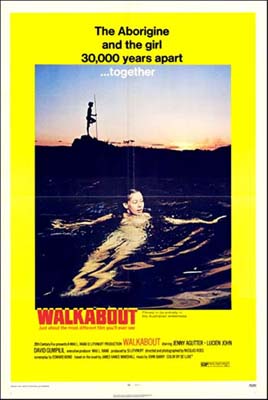
Walkabout 1971
Directed by Nicolas Roeg
Screenplay by Edward Bond, from the novel by James Vance Marshall
Featuring Jenny Agutter, Luc Roeg, David Gulpilil and John Meillon
Mr. Archer: Withdraw the amendment!
Mr. J.C.L. Fitzpatrick: Perhaps the hon. member will do us the favor of withdrawing from the House.
Mr. Archer: I wish the hon. member would withdraw -- he is a damned nuisance, anyway! Mr. Speaker: I have repeatedly asked the hon. member for Burwood to discontinue interrupting, and he has not taken the slightest notice.
An Hon. Member: He said "Damn!" Mr. Speaker.
-N.S.W. Hansard
Oh, wasn't it a fearful thing
When Archer murmured "D---!"?
I'm filled with pain and wondering --
Indeed I really am!
And so (I'm nearly sure) are you;
It was a dreadful thing to do --
It thrills a person through and through
When Archer murmurs "D---!"
Another tale I'll tell to you
Of one who murmured "D---!"
There was a certain Bishop who
Contrived to miss his tram;
And though he could not curse his fate
(For Bishops have to keep sedate)
A layman, who was also late,
Ejaculated, "D---!"
That bishop shook that layman's hand!
(The hand was like a ham.)
That bishop smiled with pleasure and
His eyes with water swam!
"My friend, how kind that was of you
To say what I was thinking, too,
But could not say! It wouldn't do
For ME to murmur 'D---!'"
So pressmen in the House at night
(They must not call out "D---!")
Who have to write the blatherskite,
As silent as a clam,
And listen to the dreary crew
Who want to talk till all is blue
Will bless the name of Archer who
Breathed out that hearty "D---!"
First Published in The Bulletin, 3 September 1903
Juliet Marillier ponders the problems associated with changing the current work-in-progress due to a contractural obligation. The resultant conflict showed up in the new work, necessitating a re-think and a big rewrite. A good lesson for young writers: if it isn't working, chuck it out.
A correspondent from "Speakeasy", the weblog of The Australian Writer's Marketplace, attended the Byron Bay Writers' Festival last weekend and wrote up their impressions of a few of the panels. Research and Fiction featured Garry Disher, Gabrielle Lord, Carrie Tiffany and Richard Flanagan; Kiss-Ass Protagonists [strange American spelling there] had James Phelan, Gabrielle Lord and Michael Robotham; Robert Dessaix was in conversation with Ramona Kaval; and Annette Barlow (Allen & Unwin), Ivor Indyk (Giramondo) and Bernadette Foley (Hachette Livre) chatted to Varuna director Peter Bishop about Australian Publishing.
Trent Jamieson won the 2005 Aurealis Award for Best Science Fiction Short Story and asks: Does it say anything about my work? and Does it change your life?
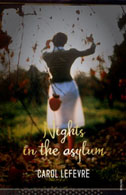 | Carol Lefevre NIGHTS IN THE ASYLUM Vintage, 319 pp. Source: review copy Review by Perry Middlemiss |
You could be forgiven for thinking that a new genre is emerging in Australian literary fiction: the genre of "escape" fiction. Not escapist, there is certainly enough of that around, but "escape" - the act of leaving a bad place in the hope of reaching somewhere better, or at least acceptable. Grace by Robert Drewe would fit, with its protagonist fleeing an inner-city stalker for the wilds of north-western Australia; and there are escapes, of sorts, in both Dreams of Speaking by Gail Jones and Candle Life by Venero Armanno.
Escapes, in this context, should not be confused with "journeys"; the two are very different. Epic fantasy utilises the concept of the physical journey as a means of transforming the protagonists from their initial state of innocence to hero status at journey's end. The literary fiction equivalent is the "road" novel, where the end is less important than the act of getting there, and the life changing events that are experienced along the way. This new "escape" genre almost dispenses with the journey, preferring to emphasise the arrival, or post-arrival, aspects of the story.
Such is certainly the case with Nights in the Asylum, a first novel by Australian writer Carol Lefevre. In this book, three very different characters find themselves in an old partly dilapidated mansion in an outback mining town. Each is fleeing a particular form of abuse and, while their respective journeys are described in the novel, "how" they got to the house seems of little importance. Indeed, very much of lesser import than the "why".
Miri, the novel's main character, has left her husband in Sydney after the death of their university-aged daughter, Alice. The triple blow of her daughter's psychiatric illness, followed by Miri's discovery of her husband's infidelities, and then the daughter's death, prove too much for her to cope with and she travels back to the mining town where she was born; back to the house her grandfather built for her Cuban grandmother. Along the way she picks up the hitch-hiking Aziz, a silent man of little English, who, we later find, has somehow escaped from an immigration detention centre and who seems intent on nothing more than never going back. Although the house is supposed to be locked up and empty, Miri finds local townswoman Suzette and her baby daughter hiding from her policeman husband in one of the upstairs bedrooms.
The arrival of the three in this house precipitates another journey in each of them. Aziz is trying to survive in a country he doesn't understand, fleeing the abuse that only a state can inflict on a person, searching for freedom. Suzette is also searching for freedom, but first has to discover the inner courage to escape her physically and mentally abusive husband in order to save her and her daughter's lives.
Miri initially thinks she has reached the end of her journey by returning to where she began. Yet this is just another starting off point for her. She was unable to save her daughter from herself, but discovers that she may just be able to save the others and, in the process, undergo a form of redemption.
It's a pretty good setup, all in all. It allows the author to explore three very different worlds, and three very different lives which just happen to intersect in one old house. Lefevre examines the intersecting story-line strands in chapters told from the different points-of-view of the main and subsidiary characters, in present time and in flashback, building up the layers of novel as she goes. Handled poorly this can be a recipe for disaster as the reader's focus changes too often and with too little delineation between strands. Lefevre doesn't fall into that trap and the overall effect of this technique adds, rather than detracts, from the final result.
The only quibble I have with the book relates to its ending. Suzette's husband comes looking for her and is suspicious of Miri, seemingly all alone in this great house. The presence of Aziz and Suzette becomes known to some sympathetic neighbours, but the more people who know of them only increases the likelihood that the police will be informed. Lefrevre decreases the size of her chapters and sentences, instilling a sense of urgency into the formulation of an escape plan, and ramping up the tension as the police spiral in towards them. And yet, at the end, it finishes in a rather off-hand manner. The reader isn't looking for a final "showdown" or resolution as in a mystery novel, but the final scene, of the main part of the novel, feels rather like a let-down.
The last part of the book consists of nine very short chapters describing a set of "undated photographs". You are led to believe these show the novel's protagonists at some time in the future, after the end of the novel, though I found the effect too obscure to render much enlightenment. Maybe if I'd paid more attention to the description of the characters or their surroundings during the course of the book I might have been better placed to appreciate these appendices. It's asking a lot of a reader to be that attentive.
I should say that I'm talking from my own perspective and failings here. In general, the book shows a talent for character, timing and place that augurs well for the future. My misgivings about various parts of the book can probably be explained by the fact that this is a first novel. If future efforts improve on this then they will be very good indeed.
"The Australian" is reporting that Fred Schepisi, best known for such films as The Chant of Jimmy Blacksmith, Evil Angels and Last Orders, is slated to direct a film adaptation of Kate Grenville's novel The Secret River. The screenplay will be written by Jan Sardi, who wrote the script for Shine. No cast members have yet been named.
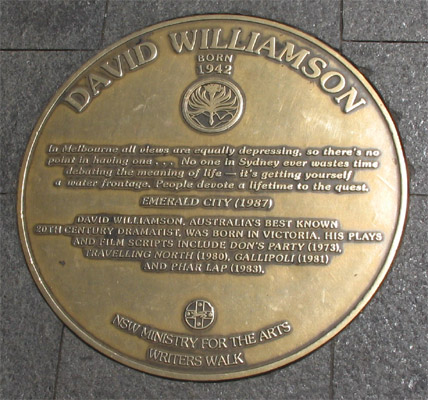 |
David Williamson plaque, Circular Quay, Sydney.
The number of visitors to this weblog has just clocked over 150,000 since October 19 2005, when I installed the statistics counter. I ticked over 100,000 visitors on February 15 2007. This entry is for archive purposes only.
The 2007 Books Alive Great Read Guide has been launched. As the website states: "Books Alive is an Australian Government initiative that aims to encourage all Australians to experience the joys of reading. Every year, Books Alive runs a nationwide campaign to ignite the country's passion for books and make it easier to choose a really great 'read'".
Fifty books are listed as suggestions for a "great read" in the following genres: Biography, Travel, Popular Science, History, Teen Fiction, Fantasy, Kids, Crime, Fiction, and Thriller.
It's a pretty good list, and I commend the initiative. For a short period, copies of The Ballad of Les Darcy by Peter FitzSimons will be given away with any purchase from the books in the guide.
The promotion runs until the end of August 2007.
The winners of the 2007 Bulwer-Lytton Fiction Contest have been announced, and it is pleasing to see that a few Australians have featured.
Neil Prowd, of Charnwood, ACT, won the Historical Fiction category with: "Samson looked in the mirror and, when he saw what a fantastic haircut Delilah had given him, he went weak at the knees."
Ann Medlock, of Lenah Valley, Tasmania, won the Science Fiction category with: "What a pity Dave was too young to have seen 2001: A Space Odyssey, for he might have been able to predict what would happen next, when the ape standing next to the big black slab picked up the tapir bone."
And Karl Scott, of Brisbane, Queensland, won the Vile Puns category with: "I was in a back alley in Fiji, fighting desperately and silently for my life, fighting desperately for oxygen, clawing at the calm and almost gentle pressure of the fabric held over my face by implacable, ebony thighs when I realized -- he was killing me softly with his sarong."
But read them all. It's a pretty good laugh.
Conflux 4 is a science fiction convention which will be held in Canberra over the weekend of September 28 to October 1, 2008. Guests of the convention include: Graham Joyce, Garth Nix, Simon Brown, Donna Maree Hanson, Kaaron Warren, Kevin J Anderson and Rebecca Moesta, and Jonathan Strahan. Full membership, hotel and site details are available on the website.
As a lead-in to the convention, Conflux is running a Virtual Minicon this weekend. This is an open internet forum which will allow you to chat to a number of the guests and other Conflux members. A very interesting idea indeed.
